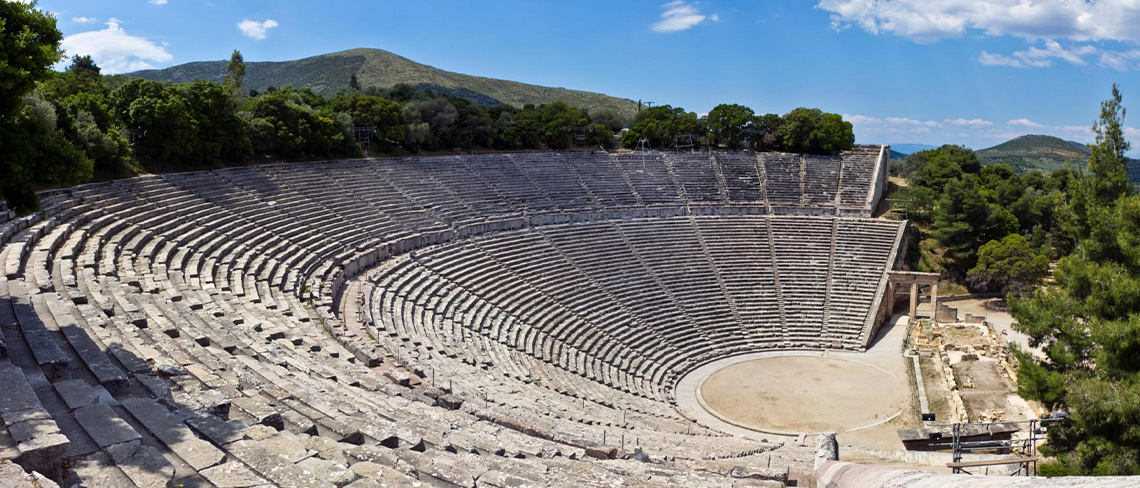
- Streaming to audiences around the world on 10 July, 21:00 (GMT +3).
- Comic masterpiece The Frogs, by acclaimed director Argyro Chioti, will last 1 hour and 45 minutes.
- The show will take place inside the archaeological site of the Sanctuary of Asclepius famous for its acoustics, symmetry, and beauty.
As the world is still reeling from the pandemic and exploring new ways to re-ignite theatre in the COVID-19 era, the Athens Epidaurus Festival invites international audiences to the most beautiful theatre of the ancient world for a live broadcast of Aristophanes’ comic masterpiece The Frogs, by acclaimed director Argyro Chioti in her Ancient Theatre of Epidaurus debut. The play includes a stellar cast of renowned Greek theatre actors and a strikingly original musical performance.
To watch, head to: www.livefromepidaurus.gr, or watch the trailer here: https://www.youtube.com/watch?v=DxZya-9My2c
Following last year’s hugely successful live streaming of The Persians by the National Theatre of Greece, watched by over 100,000 viewers worldwide, The Frogs will be streamed live on July 10 at 21:00 Athens time (GMT +3), with the support of the Hellenic Ministry of Culture and Sports, in collaboration with Google Greece. The performance will be available worldwide (with the exception of Greece) and exclusively through livefromepidaurus.gr and at the Festival’s official YouTube channel, Athens Epidaurus Festival, free of charge, although donations are welcome. The performance will be in Greek, with English subtitles, and lasts approximately 1 hour and 45 minutes.
Written in 405 BC, at the end of the Golden Age of Pericles, The Frogs is one of Aristophanes’ timeless and most beloved masterworks. The play tackles the descent of god Dionysus to the Underworld, where he embarks on a quest to bring the best tragic poet back to the world of the living, in an attempt to restore theatre to its former glory. Thank to this play, culminating in an iconic scene of poetic “duel” between Aeschylus and Euripides, Aristophanes provides a scathing commentary on the bankrupt political values of his time. A delightful gem by a writer whose work remains as relevant as ever.
Artistic Director, Katerina Evangelatos, says: “We are overjoyed to be able to digitally welcome, for a second year, international audiences to the most iconic ancient theatre. We all have the chance to experience an ancient Greek comedy through the eyes of a young female director, Argyro Chioti, who is making her Epidaurus debut. Aristophanes’ The Frogs is a thoroughly amusing play that also provides food for thought, as it ponders the roles of Poetry during turbulent times.”
Director Argyro Chioti says: “Plunging into a comic Underworld, where everything is light and fluid, the characters in The Frogs dance and sing on tiptoe. Poetry becomes the goal, a means of uplifting their heart and mind.”
-Ends-
For further press information, please contact:
Emma Arthurs | Account Director
Rooster. We are pr.®
T: +44 (0)203 440 8926
M: +44 (0)7496 838 351
E: [email protected]
Mikela Mandalenaki | Head of International PR
Marketing Greece
T: +30 210 36 49 080
E: [email protected]
About The Ancient Theatre of Epidaurus
Located inside the archaeological site of the Sanctuary of Asclepius, in the Argolis prefecture of the Peloponnese, a half-hour drive from Nafplio and approximately two hours from Athens, the Ancient Theatre of Epidaurus is the best-preserved monument of the Sanctuary, attracting many visitors from around the world.
The Theatre is universally famous for its excellent acoustics, symmetry, and beauty. Experts generally agree that the theatre was built in two distinct phases: the first phase dates back to the 4th century BC and the second to the mid-2nd century BC. Unlike other theatres of the Classical and Hellenistic periods, the Epidaurus theatre was not modified during Roman times, and as such retained its original form throughout antiquity.
In 426 AD the Theatre fell out of use after almost 1,000 years of continuous operation. Interest was revived in the 19th century, as the Theatre underwent a series of reconstruction and restoration works. The founding of the Athens Epidaurus Festival in 1955 firmly placed ancient Greek drama centre stage. Over the last half century or so, this world-renowned theatre has hosted major Greek and international artists, in primarily ancient drama productions, and occasionally opera, dance, and classical music. In 1988, the Theatre, along with the entire Sanctuary of Asclepius, was made a UNESCO World Heritage Site.
About The Athens Epidaurus Festival
The Athens Epidaurus Festival is Greece’s leading cultural organisation and one of the oldest continuously running festivals in Europe. Spanning 66 years, the Festival has welcomed some of the greatest music, dance, and theatre artists of the international and local scene, in collaboration with the most prestigious Greek and international institutions.
Up until 2005, the Festival had been held exclusively at the Odeon of Herodes Atticus and the Ancient Theatre of Epidaurus. In the summer of 2006, five brand-new theatre stages were launched at the Peiraios 260 industrial venue which has since emerged as an important springboard for contemporary art. Artistic productions and site-specific performances are also presented at other venues in Attica and further afield, as part of the Festival.
Theatre director Katerina Evangelatos was appointed Artistic Director in September 2019. Expanding the Festival’s international character and supporting research in audience development in the field of performing arts, have been her two main goals. Novel research initiatives are designed with an international outreach in mind, targeted both at specialists and the public at large. At the same time, artistic creation in theatre, performance, music, dance, visual arts, playwriting, and publishing is actively encouraged, the goal being not only to present works by talented local artists in Greece but to also promote them overseas.
Seeking unconventional, alternative ways of showcasing the Festival venues is a key aspect of the Festival’s new philosophy. Along those lines, artistic events are now also held during the winter, expanding the summer programme.






